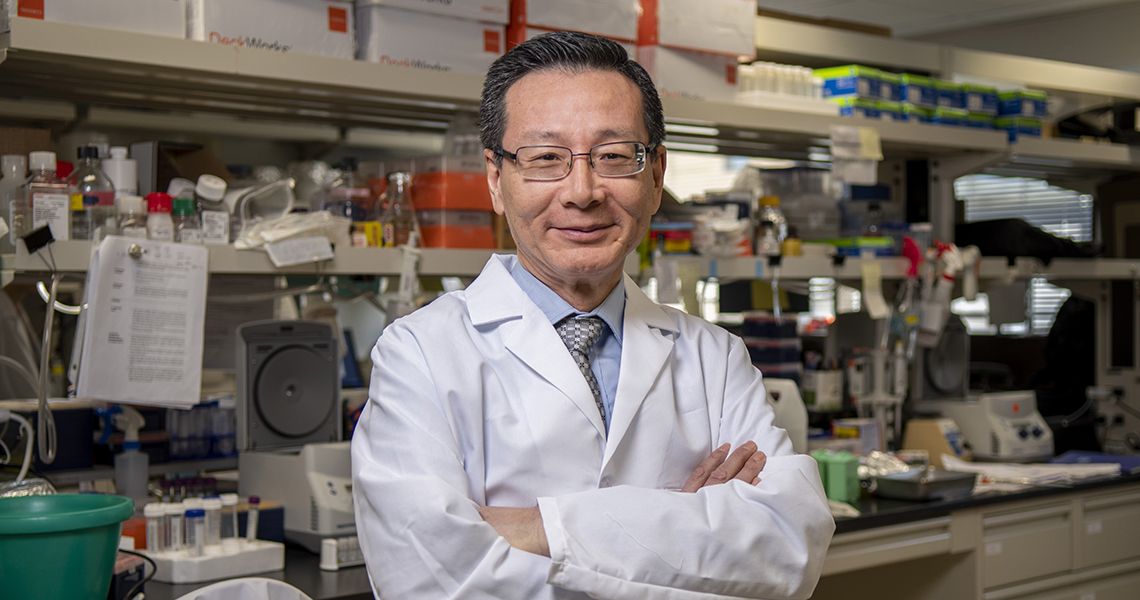Rong Li, PhD, chair of the Department of Biochemistry and Molecular Medicine and Ross Professor of Basic Science Research at the George Washington University (GW) School of Medicine and Health Sciences, was named the 2024 GW Inventor of the Year. Li will officially receive the award at the 14th Annual Faculty Honors Ceremony, April 23, in honor of his research addressing breast cancer treatment and prevention, particularly triple-negative breast cancer.
The award, now in its second year, recognizes regular, full-time faculty members for their research contributions through transferring technology, moving science from the lab to the commercial sector. The honor comes with a $1,000 prize to be used for professional development.
“Dr. Li’s commitment to innovation and collaboration with the Technology Commercialization Office and industry partners to translate academic discoveries from the lab to the world captures the spirit of the GW Inventor of the Year Award in advancing GW’s mission of impactful research,” said Brian Coblitz, executive director of the Technology Commercialization Office, in a letter announcing the award.
Li received this year’s award based on his work applying discoveries about the underlying mechanisms found in certain kinds of breast cancers that prevents immune cells from entering tumors and killing the cancer cells inside.
Immunotherapy, one of the most exciting developments in anti-cancer therapies in recent decades, works by rejuvenating anti-cancer immune cells that are already present in tumors. Despite that promise, Li said, the response rate to current anti-cancer immunotherapy is still relatively low.
“Many solid tumors,” he explained, “have the ability to build up these lines of defense, like a string of barbed wire, to prevent host immune cells from entering the tumor in the first place.”
Li and colleagues at the GW Cancer Center as well as the University of Texas Health Science Center in Houston (UTHealth Houston), identified DDR1 as the molecule that orchestrates construction of that barrier. Together they created a humanized antibody that they demonstrate can neutralize the molecule’s ability to organize that defense.
In pre-clinical models, when investigators treated tumor-bearing mice with the neutralizing antibody, they found it broke down the defense line around the tumors, allowing immune cells to enter, and ultimately resulting in shrinkage or slower growth of tumors.
Throughout that investigative process, Li worked in parallel with the GW’s Technology Commercialization Office to speed the bench-to-bedside process.
“It’s been a steep learning curve for me as a basic scientist,” he said. “It really takes a village to pull together all these experts, with complementary expertise.
Normally, he explained, investigators conduct research and publish their findings, establishing a conceptual foundation. Next, they reach out to more therapeutic or translationally oriented scientists to partner on the development of a drug or antibody treatment. Then, after a series of studies demonstrating safety and efficacy in the preclinical environment, research teams might patent their ideas and connect with potential industry partners.
“We sort of did it all in parallel,” he explained. “We started collaborating with our therapeutic antibody development group in 2019, patented our invention and had it licensed by a biotech partner before we published our paper in Nature in 2021.”
From the very beginning, Li said, GW’s Technology Commercialization Office was a great partner, working their counterpart at UTHealth Houston to identify and negotiate with Parthenon Therapeutics (now Incendia Therapeutics), who went on to raise $65 million to develop its pipeline of products, of which the anti-DDR1 antibody is furthest along in development.
“I am deeply appreciative of the fact that our university leadership has the vision and deep understanding of what it takes to translate discovery science to a clinically impactful arena,” said Li. “That really allowed us to accelerate the whole process of transition into the clinical trial process.”



